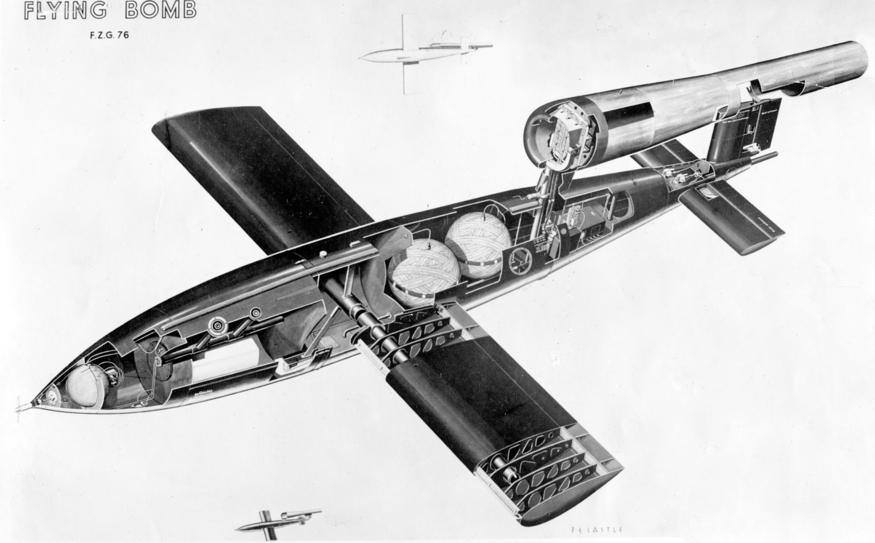
One sunny morning in June 1944, aged 11, I was attending an art class at John Lyon School in Harrow, when suddenly, without warning, my head was filled by the roar of the engine of a pilotless V1 flying bomb carrying a ton of deadly high explosives.
It had come hurtling over the brow of the hill on which the school was situated. At one moment I was quietly attempting to draw the head of a horse, at the next my head was filled by the roar of the plane's engine, making it feel as if my head would burst. My heart began to beat incredibly fast, and was like a Jack-in-the-box in my throat. A second or so later, the plane's engine stopped, to be followed by the most eerie silence and sense of expectancy I have ever experienced. It was as if I were in a large vacuum where time did not exist. 'Boys! Boys!' the master, Mr Phillips shouted. 'Quick! Get under your desks!'
It was too late to run to the shelters. In an instant, my world reduced to just me. Terrified beyond description, afraid to the point of being unable to think, with my mind filled with terror and my heart beating so forcefully that it seemed that it might jump out of my mouth, I dropped to the floor and crouched under my desk with my head between my knees, waiting for the bomb to explode and blow me and my classmates to smithereens. Please dear God, I don't want to die. Please dear God, I don't want to die, was all I could think.

At the next moment there was a huge explosion followed by the tinkling of glass falling around us. Crouched underneath my desk, I muttered a final plea to my maker, 'Dear God, have mercy on me... Please, please have mercy upon me ... I don’t want to die.'
An eerie silence followed the explosion during which I expected the building to collapse on us. But it did not collapse, and I realised that perhaps I was going to live, and that the boys on either side of me were alive, and perhaps were going to live.
I crawled out from under my desk, and in the next moment, along with the rest of the boys in the class, I was standing up, taking stock and looking around to see what damage had been done to the building. I was alive! I had survived! I had not even been hurt! We were all alive! We had all survived!
Although we were still too stunned to say much, the sense of relief among us was almost palpable. The building had not collapsed, the roof had not caved in upon us, but most of the windows had been blown out and showers of glass had landed on us.

As the realisation sank in that we were safe, our minds began to function again, and we started to chatter nervously to the boys nearest to us.
Very carefully, we picked glass off one another. Then, with glass crunching under our feet, we began to move about the classroom, shouting and laughing with relief.
A senior boy, a prefect, came into the class and talked to Mr Phillips for a moment.
'Boys!' Mr Phillips shouted. 'You've been splendid! The headmaster wants to see you all in the main hall of the New Building. Please file out in an orderly fashion.'
The headmaster addressed us in the main hall. 'We will say a brief prayer for our delivery,' he said. 'Then you can go home for two days while the school is cleaned up. There probably won't be any glass in the windows for a while when you return.'
Only one boy in my class had been hurt. It was said that a tiny fragment of glass had entered his back, and that as a result of the shock, he developed TB.
The bomb had glided 300 or 400 yards beyond the school's playground, and had hit a row of houses at the bottom of the hill, destroying three and killing two or three people.

The above is an extract from Memories of a Wartime Childhood in London by Douglas Model, published by The History Press, RRP £12.99.



